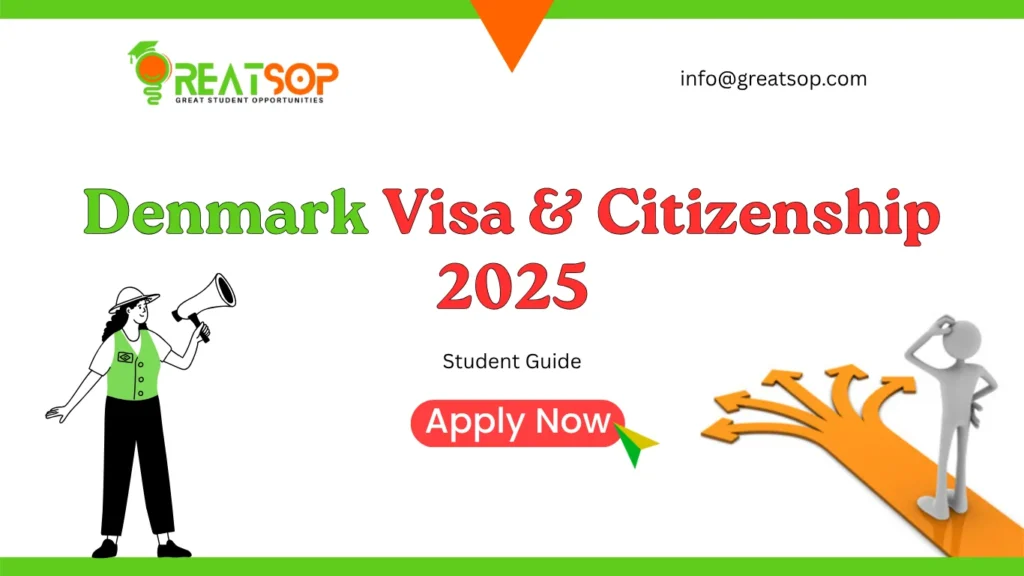Denmark is in the Schengen Area, so many travelers (EU/EEA, UK, US, Canada, etc.) enjoy Denmark visa-free access for short stays (up to 90 days in any 180-day period). (Note: starting in 2026 even visa-exempt visitors will need an ETIAS travel authorization.) For longer stays – studying, working or living – you need a proper Danish residence permit.
- Short-term visits: Citizens of Schengen countries, the EU/EEA, and most “visa-waiver” nations (e.g. US, UK, Australia, Canada) can enter Denmark without a visa for up to 90 days.
- Student visa (Residence & Work Permit): If you enroll in a Danish university or college, you apply for a residence permit as a student. You must be admitted to a full-time, state-approved program and show you can support yourself financially (about DKK 7,086/month in 2025).
- Work permits: As a student in a state-approved program, you automatically get a limited work permit allowing up to 90 hours per month (September–May) and full-time work in summer. (If you have a mandatory internship, you can work full-time during it.)
- Family reunification: Spouses/partners and children under 18 can usually join a student if your program is state-approved. (Important change: After 2 May 2025, students in non-state-approved programs will no longer be allowed to bring family members.)
- Job-seeking permit: Upon graduation from a full Danish higher-education program, you may receive a 6‑month or 3‑year “job-seeker” permit, depending on your degree. (After May 2025 this only applies if you started a qualifying program before 2 May.)
Student Opportunity: Giles Family Foundation Scholarship
Step-by-Step Process
- Apply for the right visa: Secure admission and collect documents (acceptance letter, valid passport, proof of funds (~DKK 7,086/month), health insurance, etc.). Submit your application (often via the Danish Agency for International Recruitment and Integration, SIRI). Remember to sign with MitID and pay the fee.
- Maintain your permit: Follow the rules during your studies. Keep active enrollment, renew on time, and don’t stay abroad over 6 months or give up your Danish address. If studying more than one year, document at least 12 months of funding (max DKK 85,032/year). Take advantage of free Danish classes and settle registrations (CPR number, health card).
- Work during study: You may work part-time as above. Never exceed your allowed hours, or you could be fined and even lose your permit. Use any internship slots – they allow full-time work for that period.
- After graduation – stay and work: If you earn a Danish degree, apply for the post-study job-seeking permit. This gives you time (6 months or 3 years) to find a job in Denmark. Once employed, you can apply for a new work permit based on your job offer.
- Toward Permanent Residency: After roughly 8 years of continuous legal residence (with valid permits), you can apply for a permanent residence permit. Meeting additional criteria (age, employment, language, no serious criminal record) may shorten this to 4 years, but 8 is the norm.
- Pursue Danish Citizenship: To naturalize, you generally must have 9 years of residence in Denmark (8 for refugees) and a permanent residence permit for at least 2 years. You must also be financially self-sufficient (no long-term welfare benefits), pass Danish language tests (level 2 or 3), and a citizenship exam on Danish culture. Once approved by Parliament, you sign a declaration and officially become a Danish citizen.
Read More: University of Hamburg Merit Scholarships
Tips & Common Mistakes
- Apply early: Start your visa/residence permit process well before your planned arrival. Processing can take 1–2 months or more. Always renew at least 4 months before expiry.
- Know the rules changes: Be aware of the May 2025 reforms: for example, after 2 May 2025 third-country students in non-approved programs lose work, job-search, and family visas.
- Keep documents current: Maintain a valid passport (permits expire 3 months before your passport does). Keep financial proofs up to date. Register your address in Denmark; losing CPR status ends your permit.
- Avoid welfare dependency: Don’t rely on government benefits (except student loans or scholarships); receiving public cash assistance can delay or block permanent residency or citizenship.
- Learn Danish early: Start Danish classes while studying – you’ll need at least Danish 2 or 3 level to naturalize. Engagement with local culture and work can strengthen your application.
- Follow work limits: Never work more than allowed by your student visa permit. Doing “illegal work” can trigger fines or permit revocation.
- Stay informed: Use reliable official resources – the NYidanmark site for visa applications and Lifeindenmark for settling in Denmark. ICS (International Citizen Service) offices can help newcomers with registrations and questions.
Resources
- Nyidanmark (SIRI) – Official portal for applying for Denmark visas and permits.
- Lifeindenmark.dk – Government portal with practical info (MitID, CPR, health card, housing, taxes, language, etc.).
- Study in Denmark – Info on universities, programs, scholarships.
- International Citizen Service (ICS) – Local one-stop help desks for new residents.
- Consulate/EU Info – Danish embassies handle visa interviews; follow their guidance for required documents.
Conclusion
Denmark offers great opportunities for international students – top-ranked schools, a strong job market, and a path to citizenship. By planning carefully (visas, funding, extensions) and meeting each requirement (residency, work, language), you can confidently work toward your Danish dream. With persistence and preparation, you’ll be well on your way to living, studying – and eventually becoming a Danish citizen. Start your Denmark journey today! Don’t miss this opportunity.




